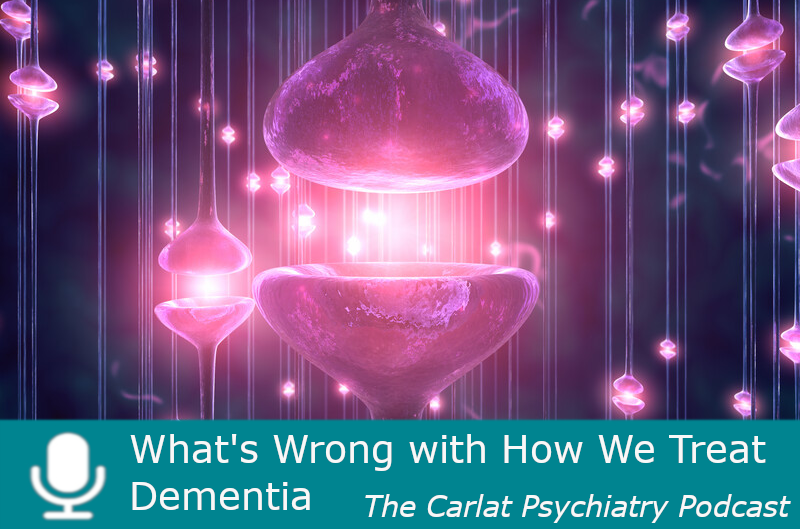Aducanumab (Aduhelm) just got FDA approval in dementia, but many experts think it should not have passed the finish line. We interviewed Peter Whitehouse, professor of neurology at Case Western Reserve University and author of American Dementia, on what went wrong.
Published On: 11/15/2021
Duration: 12 minutes, 4 seconds
Referenced Article: “In the News: Aducanumab (Aduhelm),” The Carlat Psychiatry Report, November/December 2021
Chris Aiken, MD, Kellie Newsome, PMHNP, and Peter J. Whitehouse, MD, PhD, have disclosed no relevant financial or other interests in any commercial companies pertaining to this educational activity.
Transcript:
CHRIS AIKEN: Today, a medication for dementia that everyone is talking about but few are using.
Welcome to the Carlat Psychiatry Podcast, keeping psychiatry honest since 2003. I’m Chris Aiken, the editor in chief of the Carlat Report. And I’m Kellie Newsome, a psychiatric NP and a dedicated reader of every issue.
KELLIE NEWSOME: There’s a controversy in neurology, and last summer it boiled over into the public square. It’s about how we treat dementia, not just as physicians, but as a society, and the thing that tipped it over was the FDA’s approval of a new medication for dementia, Aducanumab. Most of our audience is not going to be prescribing this medication, but patients are likely to ask your opinion of it, so I recommend Dr. Aziz brief review in this month’s Carlat Report.
CHRIS AIKEN: Here’s a highlight. And I have to confess, when I read this sentence I thought it was a typo and almost sent it back to Dr. Aziz for correction:
KELLIE NEWSOME: “Aducanumab causes amyloid related imaging abnormalities. These are visible on MRIs and fall into two categories: 1) brain swelling and 2) small brain bleeds.”
CHRIS AIKEN: Right there – this is a medication for dementia, so I’m thinking it should reduce brain swelling and the risk of small vessel bleeding in the CNS – not cause them.
KELLIE NEWSOME: And you’re sure this is not a typo?
CHRIS AIKEN: Positive. We’ve checked it over many times, and the FDA even requires regular MRIs to monitor for these problems while taking the drug. And the problem is not rare – the rate of cerebral edema was 35% on the medication vs. 3% on placebo, and microhemorrhages were 21% on the med vs. 1% on placebo.
KELLIE NEWSOME: Microhemorrhages. That doesn’t sound like a good thing for dementia, or for anyone.
CHRIS AIKEN: And that’s just the tip of the iceberg. There were several other major controversies surrounding the approval of this drug, and we detail them all in the issue. We also called up Peter Winehouse, professor of neurology at Case Western Reserve University, to get his.
[Dr. Whitehouse’s response]
What about the other medications for dementia – Donepezil, memenatine, etc. They’ve had some controversy as well, with some questioning their efficacy and some placing them on lists of meds to consider deprescribing.
[Dr. Whitehouse’s response]
It sounds like medications for dementia have not lived up to their hope. The title of your new book is American Dementia: Brain Health in an Unhealthy Society, and we’re going to get into more about brain health in a future podcast with you. But what about society –what are we getting wrong in the way we approach dementia as a society?
[Dr. Whitehouse’s response]
KELLIE NEWSOME: Peter Whitehouse is the author with Daniel George of American Dementia: Brain Health in an Unhealthy Society. He is a professor of neurology at Case Western Reserve University where he holds a secondary professorship in psychiatry.
And now for the word of the day…. Graphesthesia
CHRIS AIKEN: Graphesthesia is the ability to recognize symbols when they're traced on the skin. To test it, trace a figure 8 on someone’s hand and see if they can tell what it is without looking. This probably isn’t something you’d do on a routine psychiatric exam – but why should you know about it? Because it’s one of those “soft neurologic signs” that are often seen in schizophrenia, and probably reflects a disturbance of sensory integration that is part of the disorder. Join us next week, where our hospital psychiatry team will talk about how gender influences treatment in schizophrenia.
KELLIE NEWSOME: You can read the full articles and earn CME credits at thecarlatreport.com, where we have a special offer for our podcast listeners – you can get $30 off your first year’s subscription with the promo code PODCAST.
__________
The Carlat CME Institute is accredited by the ACCME to provide continuing medical education for physicians. Carlat CME Institute maintains responsibility for this program and its content. Carlat CME Institute designates this enduring material educational activity for a maximum of one quarter (.25) AMA PRA Category 1 CreditsTM. Physicians or psychologists should claim credit commensurate only with the extent of their participation in the activity.


_-The-Breakthrough-Antipsychotic-That-Could-Change-Everything.jpg?1729528747)



